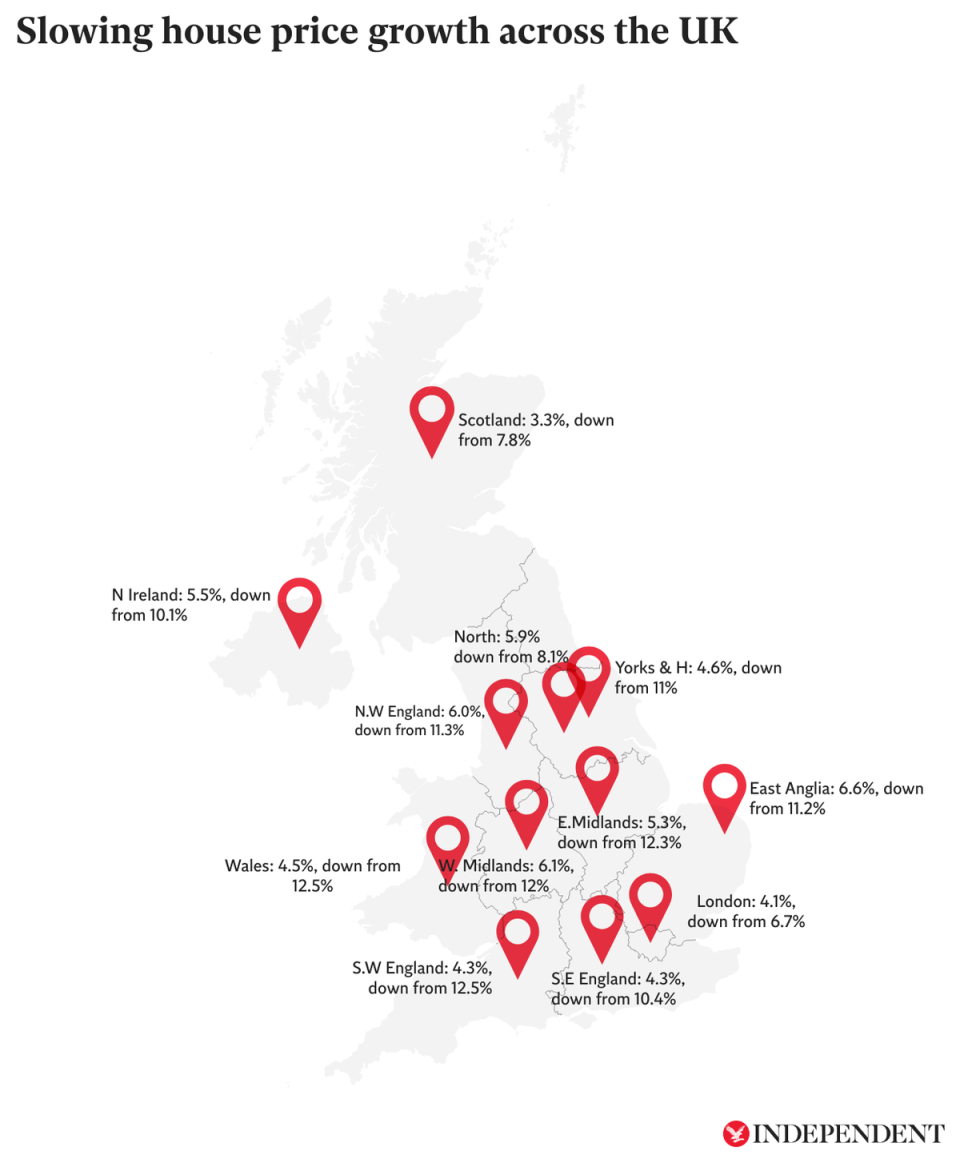UK house prices fall for fifth month in a row – here are the regions most affected

Property prices fell overall for the fifth month in a row in January as the UK housing market continues to cool following soaring growth during the pandemic.
Prices have been falling due to a slowdown in the market caused by a combination of runaway inflation, the wider cost of living squeeze and rising mortgage costs.
The average house price last month was £258,297, down by 0.6 per cent in December, according to building society Nationwide, which warned that the market is unlikely to “regain much momentum in the near term”.
All regions across the UK have seen a slump in house price growth slow in recent months, but some are experiencing a sharper downturn than others.
East Anglia was the worst affected area in the three months to December, according to Nationwide. House price growth there slowed to 6.6 per cent, down from 11.2 per cent in the previous quarter.
In the West Midlands, house price growth slowed to 6.1 per cent, down from 12 per cent. Meanwhile, the East Midlands has seen a drop from 12.3 per cent to 5.3 per cent.
Take a look at our map below for the most affected areas:


Scotland is the least affected region so far, with growth there at 3.3 per cent, down from 7.8 per cent.
In data published on Thursday, Nationwide, one of the country’s biggest mortgage lenders, said annual house price growth slowed to 1.1 per cent, from 2.8 per cent in December.
The typical property value is now 3.2 per cent lower than the peak seen last August.
The average UK house price in January 2023 was £258,297. The annual growth rate of 1.1 per cent is the lowest since the early months of the coronavirus pandemic, in June 2020, when house prices fell by 0.1 per cent annually.
House prices stalled in September last year, followed by monthly falls of 1.0 per cent in October, 1.2 per cent in November and 0.3 per cent in December.
The mortgage rates being offered by lenders jumped following the mini-Budget and borrowing costs have also been increasing as the Bank of England base rate has risen.
Robert Gardner, Nationwide’s chief economist, said: “There are some encouraging signs that mortgage rates are normalising, but it is too early to tell whether activity in the housing market has started to recover.
“The fall in house purchase approvals in December reported by the Bank of England largely reflects the sharp decline in mortgage applications following the mini-Budget.
“It will be hard for the market to regain much momentum in the near term as economic headwinds are set to remain strong, with real earnings likely to fall further and the labour market widely projected to weaken as the economy shrinks.”
He added: “Should recent reductions in mortgage rates continue, this should help improve the affordability position for potential buyers, albeit modestly, as will solid rates of income growth, especially if combined with weak or negative house price growth.

“Nevertheless, the overall affordability situation looks set to remain challenging in the near term.”
The Bank of England hiked interest rates from 3.5 per cent to 4 per cent on Thursday, which will have an immediate impact on homeowners whose mortgages directly track it.
Borrowers on fixed-rate mortgages will not feel the immediate impact, although 1.8 million customers are due to see their fixed-rate deals end at some point this year.
According to figures from UK Finance, the average tracker mortgage payment will increase by £48.99 per month.
The average standard variable rate (SVR) mortgage will increase by £30.81 per month. SVRs are set by individual lenders and borrowers end up on an SVR once their initial mortgage deal ends

 Yahoo News
Yahoo News 
